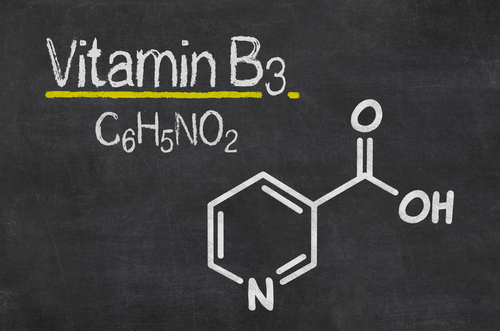Is Niacin (drug) Bad For You?
Also Known As: Niaspan, Niacor
Short answer
Niacin is a drug that is often recommended for those with high cholesterol, with the added benefit of protecting against heart attacks. Studies, however, are showing that the medication may not be effective in protecting the heart at all, and if taken excessively can put individuals at a greater risk for other health problems.
Harmful to your health. A few benefits may be associated, but the bad outweighs the good. Moderation is extremely important.
View Full Grading System
Category 'A'
Very healthy and numerous health benefits. Side effects are rare. Things rated an 'A+' are typically necessary for survival (for example, water).
Very healthy and numerous health benefits. A few harmful qualities may be associated, but only under certain circumstances such as an allergic reaction.
Very healthy and numerous health benefits. Harmful qualities may be associated, but aren't usually serious.
It is important to note that even the best things in life can become bad in immoderate amounts. So, although something may be rated an 'A+', overconsumption/overdoing can bring unwanted effects.
Category 'B'
Very beneficial to your health. Things rated a 'B+' may have a few harmful qualities to pay attention to.
Overall beneficial to your health. Things rated a 'B' may have some harmful qualities to pay attention to.
More beneficial to your health than not. However, harmful qualities are most likely associated and shouldn't be overlooked.
The main difference between category 'A' and category 'B' is the harmful qualities typically present in 'B' items. Serious side effects are usually uncommon, but are still possible and should be taken note of.
Category 'C'
Both beneficial and harmful qualities associated. Things rated a 'C+' are typically a bit more on the beneficial side. Still, moderation is important.
A fairly even ratio of beneficial and harmful qualities. Moderation is important. Very general topics that can lean towards both sides of the spectrum will be placed here as well. Rice, for example, can be good or bad depending on the type.
More harmful than beneficial. Side effects are common, especially when consumed/done excessively. Moderation is very important.
Category 'C' usually denotes to both good and bad qualities. When it comes to this category, it is important to keep this word in mind: moderation.
Category 'D'
Harmful to your health. Although benefits may be associated, the bad most likely outweighs the good. Moderation is very important.
Harmful to your health. A few benefits may be associated, but the bad outweighs the good. Moderation is extremely important.
Harmful to your health. Very few, if any, benefits are present. Things in this category should be avoided as much as possible.
Category 'D' is typically for things that are more harmful than beneficial. While consuming/doing something unhealthy once in a blue moon shouldn't hurt, we definitely recommend eliminating 'D' items as a regular part of your routine/diet.
Category 'F'
Category 'F' is for things that fail to bring anything beneficial to the table, and are very harmful to your health. We recommend completely avoiding anything in this category. Long-term side effects of 'F' items are usually very serious.
Category 'N'
'N' stands for neutral. Things placed into this category are generally (a) neither good nor bad for you, or (b) lack the necessary evidence to reach any conclusions.
Long answer
Niacin is a vitamin B pill which can be taken on its own or combined with supplements. The pill is most often used for lowering cholesterol. It may also be recommended to those with high cholesterol, who have already had a heart attack, to help prevent another heart attack from occurring. For those who take Niacin, it's important to follow doctor instructions and take exactly the recommended amount each day in order to prevent potential health problems.
There are several side effects that have been noted with niacin use. Itchy, red skin is one of the most common (also known as niacin flush). It has also been found to cause dizziness and lightheadedness, along with nausea and vomiting. These are all seen as "nuisance side effects" but it's worth noting that these symptoms alone are enough to cause many people to stop taking the medication early on. There is some concern that Niacin can also cause liver damage. This risk is more of a concern for those who drink alcohol in addition to taking Niacin. While these are all relatively common medication side effects, there are some more serious claims being made against Niacin.
Within the past few years, studies have been done to determine if Niacin is actually effective in protecting against heart attacks at all. While the medication does increase healthy cholesterol, the studies concluded that there was no reduction in the risk of heart attack or stroke. In the course of these studies, it was also found that those taking Niacin were possibly at higher risk for serious health problems including increased risk of infection, gastrointestinal bleeding, and diabetes.
Possible short-term side effects
- itchy, red skin
-
dizziness
-
lightheadedness
-
nausea
-
vomiting
Possible long-term side effects
- liver damage (especially w/ alcohol)
-
infection
-
gastrointestinal bleeding
-
diabetes
Possible withdrawal symptoms
- stress / anxiety
-
irritability
-
pain
-
muscle spasms
Ingredients to be aware of
Benefits
- promotes "good" cholesterol
-
relieves arthritis
-
promotes better sleep
Healthier alternatives
Please turn your Ad Blocker off to see this content. Thank you!
Thank you for your feedback!
Written by Rachel Adams
Published on: 12-28-2015
Last updated: 12-10-2016
Thank you for your feedback!
Written by Rachel Adams
Published on: 12-28-2015
Last updated: 12-10-2016

 Approved by
Approved by 















